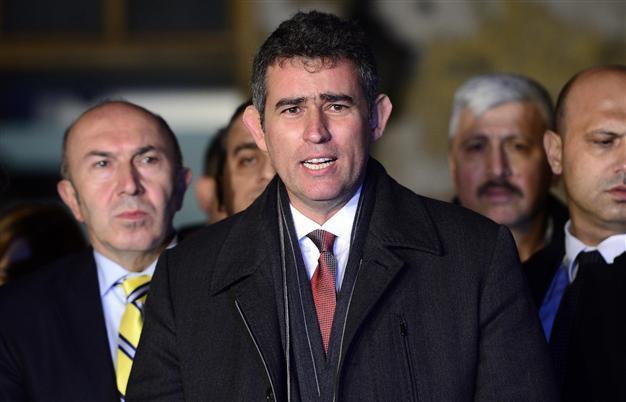‘Neither graft, nor dual justice’ says Union of Turkish Bars

In a telephone interview with the Hürriyet Daily News, Feyzioğlu gave details of his visit to Prime Minister Tayyip Erdoğan on Jan. 4 in Istanbul. AA Photo
“The row over the graft probe gave a golden opportunity to correct a grave injustice in the Turkish system,” says Metin Feyzioğlu, the chairman of Union of Turkish Bars (TBB). ”If the prime minister of the country says there is an illegitimate structure within the judiciary, then we have to give our assistance to clean it out; that’s why we are trying to do now.”In a telephone interview with the Hürriyet Daily News, Feyzioğlu gave details of his visit to Prime Minister Tayyip Erdoğan on Jan. 4 in Istanbul, during which formulas on how to retry the controversial cases were discussed. Bringing up a legal package offer on the same subject for the attention of President Abdullah Gül during a meeting on Jan. 2 in Ankara, Feyzioğlu said Erdoğan had asked Justice Minister Bekir Bozdağ to join them and they discussed legal capabilities for over 1.5 hours. “We travelled back to Ankara together with the minister and we spoke in detail of a draft during the flight to Ankara” Feyzioğlu said. “We will meet Wednesday to advance the legal work.”
Feyzioğlu explained the framework of his initiative on behalf of the TBB as follows:
“For 23 years of my law carrier, starting from the State Security Courts, I’ve been against any dual structure within the judicial system, especially when criminal courts are involved. When this government brought Specially Authorized Courts [ÖYM] the TBB stood against it, saying it would cause further injustice. The government later on abolished the ÖYMs, yet the law still authorized them until the completion of the ongoing cases. But actually, those court cases were the biggest source of injustice. Many people were held in jail as a result of extended arrest periods; their defense rights were violated and sentenced for long terms under such conditions. Now if the prime minister of the country says that there was an illegitimate structure within the judiciary, causing injustice, we as the TBB have to assist in a clean-up, regardless of the prime minister’s motivation.”
Feyzioğlu underlines that the TBB offer was nothing to do with a general amnesty, which has always been a risky step to take for governments in Turkey. Rather, it aims to open way for the retrial of all cases seen by the specially authorized courts in ordinary criminal courts. That would not only include coup-plot cases like Ergenekon and “Balyoz” (Sledgehammer), but also the KCK cases, because of which thousands of Kurdish activists have been held in jail for more than two years now, accused of being members of the urban front organization of the outlawed Kurdistan Workers’ Party (PKK), with which the government is currently in a dialogue for a political settlement for Kurdish problem.
The Feyzioğlu initiative came after Prime Minister Erdoğan’s top adviser, Yalçın Akdoğan, wrote in his newspaper column that those who are using the judiciary in their “plot against the government” through the graft probe (started Dec. 17, 2013), had earlier plotted against the “National Army.
It sounded enigmatic, but what he aimed to say is that the prosecutors and judges carrying out the biggest graft probe in Turkey were not actually going after a corruption case, but discrediting the government in order to gain control over it.
After all, Erdoğan had to sack four of his ministers whose names were involved in allegations. The assumption from Erdoğan and his Cabinet was that those prosecutors, judges and police chiefs involved in the probe operations were sympathizers of Fethullah Gülen, a moderate Islamist scholar based in the U.S., who had also carried out probes and were in charge of cases like Ergenekon, Balyoz and KCK as well. And by underlining the “National Army” words, the PM’s advisors were in fact denouncing that Gülenists in the judiciary were responsible for the imprisonment of many army officers, including Erdoğan’s Chief of Staff, İlker Başbuğ, sentenced for life because of plotting against Erdoğan.
And that is why Feyzioğlu says “regardless of the motivation of the prime minister.”
CHP leader Kemal Kılıçdaroğlu had given his open support for the retrial of the controversial cases, stressing they would not let the corruption allegations be forgotten in the meantime, since there are also critics who say Erdoğan wants to divert the attention of public opinion from the corruption allegations to the newly started feud between himself and Gülen.
“No way,” Feyzioğlu says, ”We say that it was this government who is responsible for the justice system’s wrongdoings. We are after correcting the injustice which we believe will bring relief to the sensitivities of society. But we will continue to go after all corruption allegations. I reminded the prime minister during our conservation that the Council of State’s cancellation of the government’s decree to make it obligatory for prosecutors to inform the government about the probe in advance was upon an act of the TBB. We say neither graft, nor dual justice; they are not alternatives to each other.”
Feyzioğlu, the 45 year-old professor of law, could be a new face in Turkish politics if his initiative is a success.











